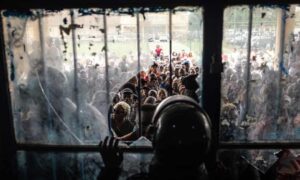
Provisional results in the Democratic Republic of the Congo (DRC) presidential election have indicated Félix Tshisekedi is the winner. As his regime secures another five years, the incumbent will once again be looking to the west to help keep him in power, as the US government did in 2018.
The DRC has lurched from crisis to crisis for more than 20 years. This is in part because the west has blocked the creation of an international criminal tribunal for the country, which is needed to end the culture of impunity fuelling violence, famine and the climate crisis killing and displacing Congolese people.
The US has supported Tshisekedi by, among other things, facilitating international grants and credit, and yet, according to the World Bank, 73% of the population live on less than $1.90 a day, and things are getting worse. The UN says 26 million Congolese are facing “very high acute malnutrition and excess mortality”, an increase from 13.5 million, or 28% of the population, in 2019.
Five years ago, Tshisekedi was humiliated by the Congolese people, coming third in the presidential race. Yet, against all available evidence that Martin Fayulu had won by a landslide, he was declared the winner – a decision the US supported. Huge international grants and credits to his regime followed, including $750m from the World Bank and a $1.5bn loan from the International Monetary Fund. Some success for a man whose record might be judged incompetent and who was rejected by voters.
In return, Tshisekedi said he would end China’s control over the DRC’s rare minerals, which poses a strategic challenge for the US and EU’s clean-energy ambitions. The DRC supplies, mostly via China, 73% of the world’s cobalt – an essential component in wind turbines, solar panels and electric vehicle batteries. In terms of untapped mineral reserves, the DRC was estimated to be worth $24tn (then about £15tn) by a 2011 UN study, which is more than the current GDP of the 27 EU member states combined.
